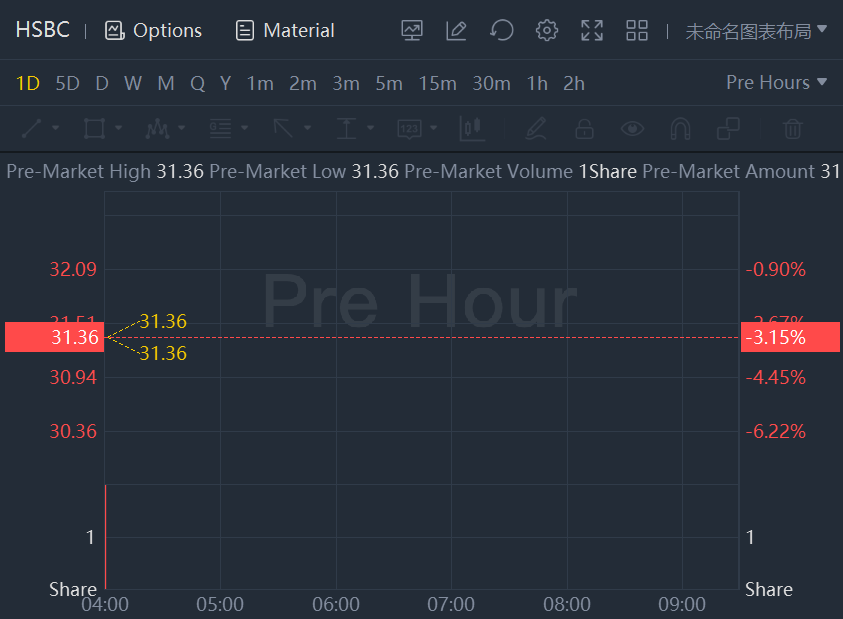HSBC shares dropped 3% in premarket trading as HSBC profit fell on credit charges as economic outlook worsened.
HSBC's profit fell by less than expected in the first-quarter but Europe's biggest bank warned that more share buybacks were unlikely this year as rising inflation and economic weakness had dented its prospects.
Soaring energy prices and supply chain outages, partly due to the war in Ukraine, are hurting bank outlooks at a time when surging inflation and potentially rapid rate rises threaten to scupper a nascent global economic recovery from the pandemic.
Still, lenders are pinning hopes on rising interest rates to bolster their profit margins.
HSBC Chief Executive Noel Quinn, who has run the London-headquartered bank for the last two years, is ploughing billions into Asia to drive growth, with a focus on the wealth management business, and has also moved global executives there.
"Although the economic outlook remains uncertain, the continued upward path of interest rates since our full-year results has further strengthened our confidence in delivering a double-digit return on average tangible equity in 2023," Quinn said in the results statement on Tuesday.
HSBC, which has market value of $130 billion, posted a pretax profit of $4.17 billion for the first quarter ending on March 31, down from $5.78 billion a year earlier.
The results, however, beat the $3.72 billion average estimate of 16 analysts compiled by HSBC, which earns about two-thirds of its reported pretax profit from Asia.
HSBC's common equity tier 1 capital ratio, a key measure of a bank's financial strength, fell 170 basis points from the end of 2021 to 14.1% as steepening yield curves worldwide hurt some of its financial hedges.
In February, HSBC brought forward its key profitability target by a year and more than doubled its annual profit as expected bad loans from the pandemic failed to materialise.
The lender dealt a blow to shareholders by saying further share buybacks, which it has used in recent years as a way of returning excess capital to investors, would be unlikely this year. It blamed volatility in the value of some investments it holds as hedges against dips in interest income.
The bank will proceed, however, with a $1 billion buyback this year which it had previously announced.
The bank said expected credit losses (ECL) came in at $600 million in the first quarter. In the same period last year it unlocked $400 million of reserves as the outlook improved.
The increased ECL primarily reflects the direct and broader economic impacts of the Russia-Ukraine conflict and inflationary pressures on the forward economic outlook, the bank said.
Profits were down on last year's first quarter due to market impacts on wealth revenue and a more normalised level of ECL, Quinn said.
HSBC ranks as one of Europe's largest banks along with BNP Paribas with total assets of $2.9 trillion as of last year.
On Tuesday, Swiss wealth titan UBS reported a 17% rise in quarterly net profit to its best since 2007 on the back of strong trading.
HSBC's revenues fell 3%, in part due to COVID-19 restrictions in the bank's biggest market of Hong Kong as its branches were closed, hitting its sales of investment products.
HSBC's London-listed shares have gained 12% this year, outperforming many British banks and the FTSE index.
HSBC's smaller rival Standard Chartered reports results on Thursday, followed by Southeast Asian banks such as DBS Group on Friday.
HSBC also holds its annual shareholder meeting in London on Friday.

